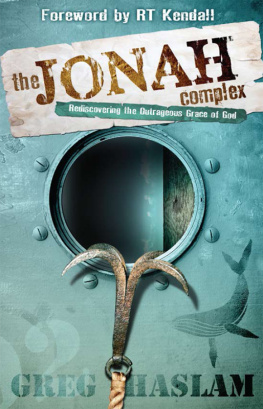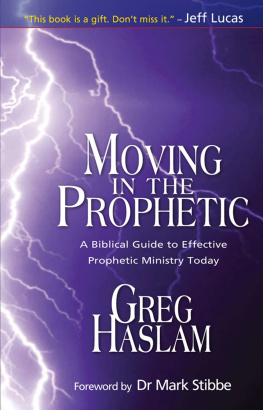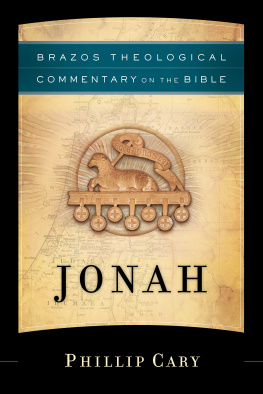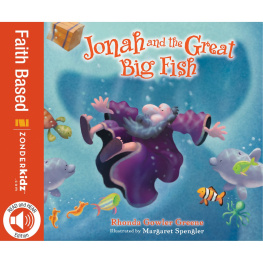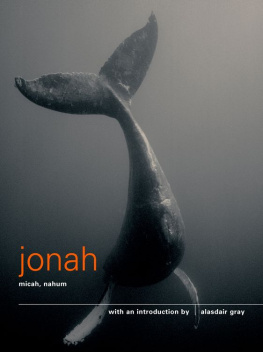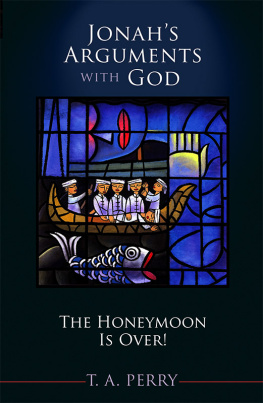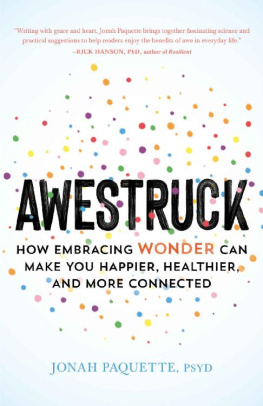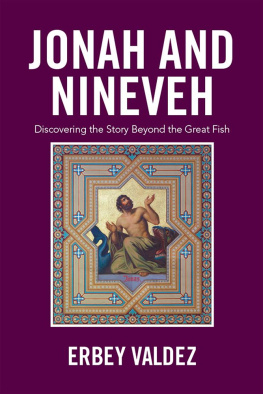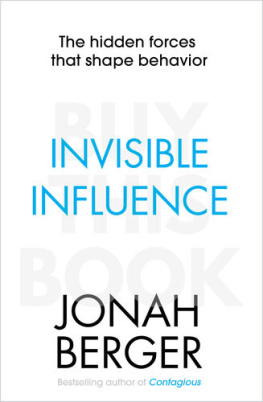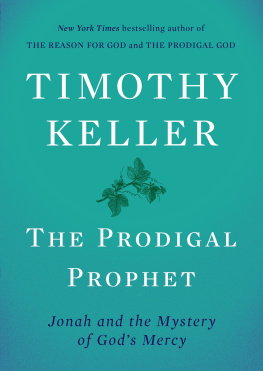My warmest thanks to Tim Pettingale, my Editor at River Publishing. We have worked together on two previous projects and Ive always been encouraged by his enthusiasm, constructive feedback and efficiency in helping turn the spoken word into written prose, whilst making it all look fairly effortless which it most certainly isnt.
Thanks also to my friend and predecessor at Westminster Chapel, Dr R.T. Kendall, to whom I owe an incalculable debt for the influence his ministry has had upon my wife and me since we first met him and attended Westminster Chapel during two years of theological training at the London Theological Seminary, beginning in the Autumn of 1978. I am grateful to him for consenting to write the Foreword to this book on Jonah, not least because he published his first book, a series of sermons on Jonah himself in 1978, and though I have not read it again since then it has lastingly affected me due to his freshness and originality. If there is any overlap with his work after all these years, it is not so much plagiarism on my part, but evidence of the impact R.T. Kendalls preaching has on anyone who has ever had the privilege of hearing him speak or reading him in print.
I also honour the members of my close and loving family, including my extraordinary wife Ruth; my three wonderful sons, James, Andrew, and Joshua; along with their equally special wives - Emily, Sie Yan and Jenny. Their loving support and joyful banter bring me tremendous pleasure and help keep me sane with their raucous fun and playful humour - another evidence of Gods outrageous grace in our lives. Thank you James, for diligently proof-reading the script of this book, in spite of the fact that in the same month your wife Emily gave birth to our third grandchild, Felix. I trust he will grow up to be a very happy child and bring much happiness to many lives, just as his name so beautifully indicates and prophetically predicts.
Finally, my gratitude to all at River Publishing for your support of this project, and especially to Stefan Proudfoot for his creative artwork and striking cover design.
Greg Haslam,
Westminster Chapel, London,
December 2011
The book of Jonah stands out as markedly different from its companions amongst the twelve minor prophets. To begin with, it is the only book written as a narrative. Its prophetic message is unusually wrapped up in its storytelling delivery. Normally, biblical prophecy is given to us through declaration and proclamation, but here the prophetic message is delivered in its entirety as the tale of Jonah unfolds. Because of its unique content and genre, one might well ask, What am I to do with this book?
Its a good question. Historically, the message of Jonah has been interpreted in a variety of different ways. Early Christians were struck by the typological similarities between Jonah and Jesus, especially due to Christs own reference to the story, highlighting the parallel between Jonahs experience in the belly of the fish and His own predicted three-day burial prior to His resurrection (Matthew 12:40-41).
Some have seen Jonah as a kind of negative stereotype of the Jews. Jonah seemed to embody the kind of xenophobia, exclusivity and lack of compassion that has sometimes characterised Jewish hearts towards their gentile neighbours. From John Calvin onwards, many have viewed Jonah as a warning to Christians against trying to resist Gods purposes and run away from Him and against devaluing the very people who God is trying to reach.
Still others have dismissed Jonah as non-literal. They argue that it is just an extended parable, fable or didactic novel. Proponents of this view insist that it is not an historical account so much as a satirical work, intended to highlight the spiritual prejudices that have marked the people of God in every generation.
But while sceptics have ridiculed the supernatural phenomena the book describes, others have defended it for its historicity, its truth-telling and its miracles. I belong to this latter category. My confident conviction is that, if Christ treated Jonah as a living, historical figure and the events of his life as real historical events, then so should we. So we work from a position of belief, rather than doubt. We are setting out to examine an authentic, historical record containing grounded, historical truth. As such, the story of Jonah carries a message for Gods people in all times and in all places because what happened to Jonah can happen to us.
A book of four themes
Perhaps the best approach to understanding the message of Jonah is to focus on its four major themes, which unfold along with the narrative:
It teaches us about Gods generous grace. This results in both divine and human repentance. In the story we see Jonahs repentance and, of course, Ninevehs repentance, but God also relents and changes His mind. This fact in itself provides us with a further conundrums which provoke our thoughts and press us for solutions.
The puzzle of unfulfilled prophecy. We read of Jonah prophesying, Yet forty days and Nineveh will be overthrown (Jonah 3:4), but that outcome didnt happen historically for another twenty years. This is a puzzle that demands our attention.
The exposure of Jewish attitudes to gentiles in mission. In doing so, it demands that the contemporary Church awakens to her calling too, so that we dont repeat Jonahs mistake ourselves, dismissing some people groups as beyond help.
Its strange defence or theodicy for Gods just government over His world. It justifies Gods actions in the affairs of world history. People are constantly questioning what God is up to, seeking to understand the puzzling decisions they believe He makes, whilst we look for answers to different situations in the world. The book of Jonah doesnt explain everything to us, but it does throw light on the fact of Gods ongoing involvement in world history.
One thing is certain here. You cannot read the book of Jonah carefully without being profoundly affected by it. Chapter 1 parallels chapter 3 as a non-Israelite audience (first the sailors on the vessel Jonah travels on, then the tens of thousands of Ninevites) are confronted with the reality and power of God leading to amazing results their conversion in both cases.
Then chapters 2 and 4 are similarly parallel as God has to deal with His own people before He can touch the nations around them perhaps the main reason why the content becomes so personally challenging for us as we read.
A provocative book
In summary, one could say that Jonahs message is both provocative and prophetic. If we, as the Church, are on the move, eager to fulfil our mandate and mission, then there are many things that are essential for us to both experience and avoid. Lets ponder some of them under these two broad headings without, at this point, seeking definitive answers.
1. It addresses us personally
More than thirty years ago, Dr RT Kendall began his ministry at Westminster Chapel with an expository sermon series on the book of Jonah. Back then he was studying for his PhD at Oxford University and wasnt initially the pastor of the church he was simply filling in for a prolonged period, the church helping him as he helped the church. He travelled regularly from Oxford to preach in London and had planned a series of eight messages, but this eventually expanded into twenty-one messages. Halfway through the series the Deacons approached him and asked him, on behalf of the church, to become their pastor.
Perhaps RT arbitrarily chose the subject of Jonah as a challenging book for a London church. But he soon realised it was more significant. Then, and over the years since, he has said of himself, I am Jonah! - because he never intended to remain ministering in the UK as long as he did. London was his Nineveh in that respect. For very similar reasons, this piece of history personalises the theme of Jonah for me. Positioned as we are in a populous megacity, it begs the question:

